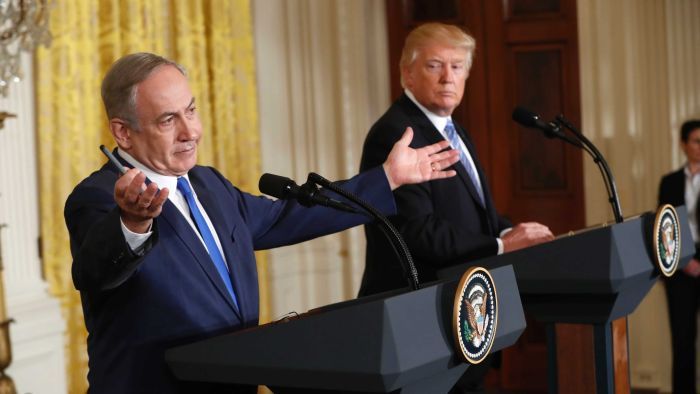Donald Trump backs away from commitment to Palestinian state in talks with Israel's Benjamin Netanyahu
Updated
President Donald Trump has dropped US insistence on a two-state solution to the Israeli-Palestinian conflict, a longstanding bedrock of Middle East policy, even as he urged Israeli Prime Minister Benjamin Netanyahu to curb settlement construction.
Key points:
- Mr Trump tells Mr Netanyahu he would like Israel to "pull back on settlements a little bit"
- Mr Trump says that he could live with either a two-state or one-state solution
- Palestine responds with alarm that Washington might ditch its support for a nation
The two leaders met face-to-face for the first time since Mr Trump's victory in the 2016 presidential election, as Palestinians urged the White House not to abandon their goal of an independent state.
Speaking at a joint news conference, Mr Trump vowed to work toward a peace deal between Israel and Palestine but said it would require compromise on both sides and it would be up to the parties themselves ultimately to reach an agreement.
"I'd like to see you pull back on settlements for a little bit," Mr Trump told Mr Netanyahu.
The right-wing Israeli leader later insisted that Jewish settlements were "not the core of the conflict" and made no commitment to reduce settlement building.
Mr Trump echoed Mr Netanyahu's calls for Palestinians to recognise Israel as a Jewish state — something they have refused to do — and to halt incitement against Israelis.
But even as Mr Trump promised to pursue peace between the two sides — who have had no substantive peace talks since 2014 — he offered no new prescriptions for unblocking the peace process or achieving a deal that has eluded so many of his predecessors.
'I can live with two-state or one-state': Trump
Among the questions expected to figure prominently on the agenda was the future of the two-state solution — the idea of creating a Palestine living peacefully alongside Israel, which has been a bedrock US position.
In a potential shift, a senior White House official said peace did not necessarily have to entail Palestinian statehood, and Mr Trump would not try to "dictate" a solution.
Mr Trump did little to clarify his position — giving a convoluted response to a question on whether he backed a two-state solution, he suggested that he could abide by whatever the two parties decided.
"I'm looking at two-state and one-state and I like the one that both parties like. I'm very happy with the one that both parties like," he said.
"I can live with either one. I thought for a while it looked like the two-state, looked like it may be the easier of the two, but honestly if Bibi and if the Palestinians if Israel and the Palestinians are happy, I'm happy with the one they like the best," Mr Trump said, referring to Mr Netanyahu by his nickname.
A retreat from US backing for a two-state solution would upend decades of US policy embraced by Republican and Democratic administrations and a principle considered the core of international peace efforts.
Palestinians alarmed at potential shift in policy
Palestinians reacted with alarm to the possibility that Washington might ditch its support for an independent Palestinian nation.
"If the Trump administration rejects this policy it would be destroying the chances for peace and undermining American interests, standing and credibility abroad," Hanan Ashrawi, a senior member of the Palestine Liberation Organisation, said in response to the US official's remarks.
"Accommodating the most extreme and irresponsible elements in Israel and in the White House is no way to make responsible foreign policy."
Husam Zomlot, strategic adviser to Palestinian President Mahmoud Abbas, said the Palestinians had not received any official indication of a change in the US stance.
Meanwhile, senior Palestinian negotiator Saeb Erekat reacted with anger at the suggestion the US could walk away from the policy.
 Photo:
Palestinian negotiator Saeb Erekat said his commitment was to the two-state solution. (ABC News: Sophie McNeill)
Photo:
Palestinian negotiator Saeb Erekat said his commitment was to the two-state solution. (ABC News: Sophie McNeill)
"Those who believe that they can undermine the two-state solution and replace it with what I call one-state two systems — apartheid — I don't think in the 21st century they will get away with it. It's impossible," he said.
"So my statement is very clear: our commitment is to the two-state solution and to those who want peace between Palestinians and Israelis."
For Mr Netanyahu, the talks with Mr Trump are an opportunity to reset ties after a frequently combative relationship with Democrat Barack Obama.
After speaking to reporters, the two leaders were due to hold talks in the Oval Office followed by a working lunch.
ABC/Reuters
Topics: world-politics, unrest-conflict-and-war, donald-trump, territorial-disputes, united-states
First posted








